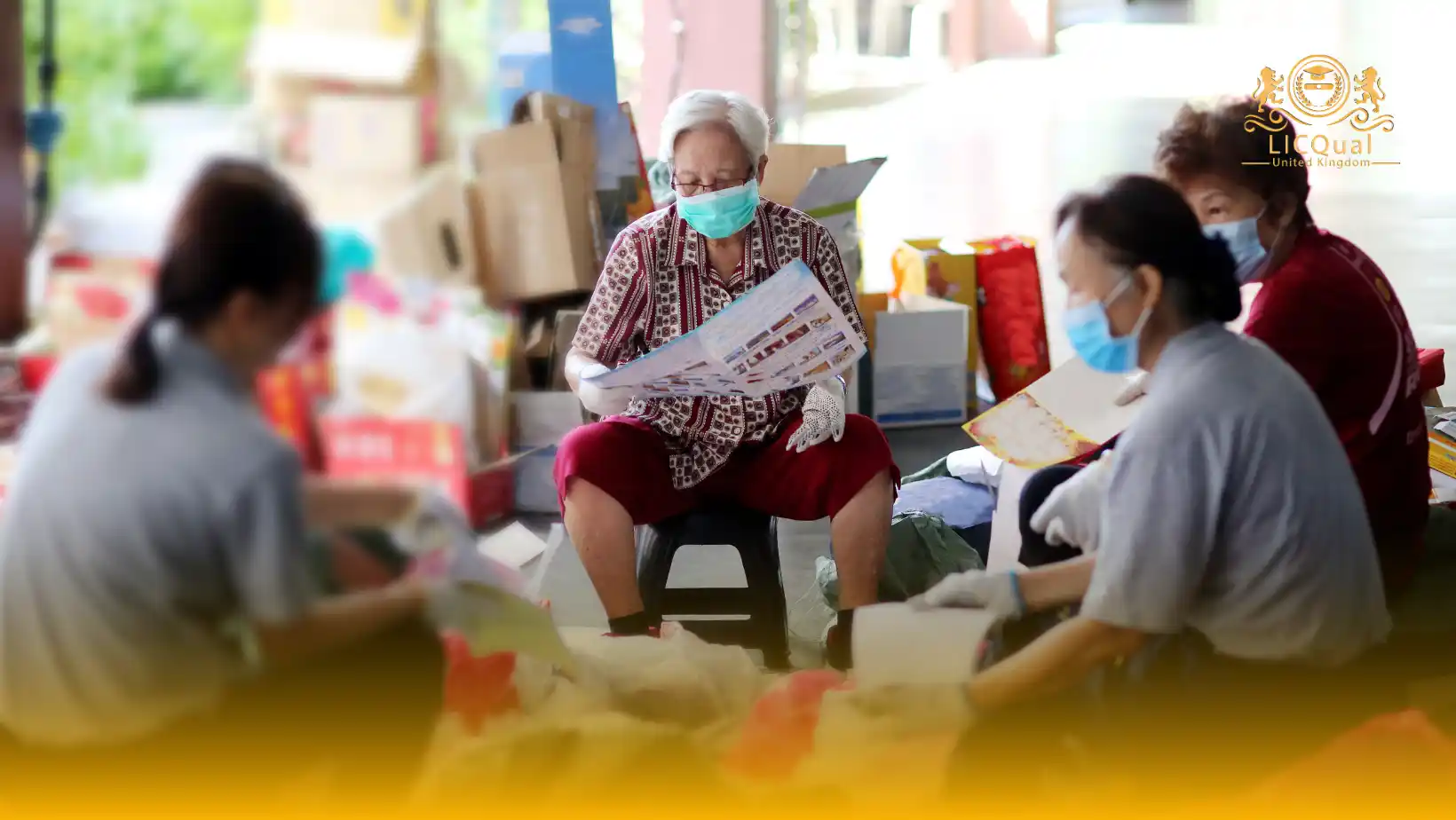The LICQual Level 3 Diploma in Community Nutrition (Dip Community Nutrition) is a specialised qualification designed for professionals seeking to develop advanced skills and knowledge in community-based nutrition and public health. This course equips learners with the expertise required to assess, plan, and implement nutrition interventions that improve health outcomes at the community level. It is ideal for nutritionists, dietitians, healthcare practitioners, public health professionals, and community health workers who wish to enhance their career prospects and expand their Continuing Professional Development (CPD).
Learners will gain comprehensive insight into the principles of community nutrition, including population dietary assessment, nutrition education, programme development, and the evaluation of public health interventions. The curriculum emphasises evidence-based strategies to promote healthy eating habits, reduce nutrition-related health disparities, and influence community health policies. Learners will develop the skills to plan and deliver effective nutrition programmes, collaborate with stakeholders, and evaluate outcomes to ensure sustainable improvements in community health.
Centres delivering the LICQual Level 3 Diploma in Community Nutrition are required to maintain high standards of training. This includes employing competent and qualified staff, providing access to up-to-date learning resources, and ensuring all necessary materials are available for effective teaching and assessment. By upholding these standards, centres guarantee that learners receive a high-quality educational experience that maximises knowledge acquisition, practical skill development, and professional success.
This qualification equips learners with the practical, evidence-based skills and knowledge needed to make a meaningful impact in community nutrition, supporting improved public health outcomes while advancing professional careers in nutrition and healthcare.
Course Overview
Qualification Title
LICQual Level 3 Diploma in Community Nutrition (Dip Community Nutrition)
Total Units
6
Total Credits
60
GLH
240
Qualification #
LICQ2201036
Qualification Specification
To enroll in the LICQual Level 3 Diploma in Community Nutrition (Dip Community Nutrition), applicants must meet the following criteria:
|
Qualification# |
Unit Title |
Credits |
GLH |
|---|---|---|---|
|
LICQ2201036-1 |
Principles of Community Nutrition |
10 |
40 |
|
LICQ2201036-2 |
Nutritional Assessment in Communities |
10 |
40 |
|
LICQ2201036-3 |
Planning and Implementing Community Nutrition Programmes |
10 |
40 |
|
LICQ2201036-4 |
Health Promotion and Nutrition Education |
10 |
40 |
|
LICQ2201036-5 |
Monitoring, Evaluation, and Research in Community Nutrition |
10 |
40 |
|
LICQ2201036-6 |
Professional Practice and Ethical Considerations |
10 |
40 |
By the end of this course, learners will be able to:
Unit 1: Principles of Community Nutrition
By the end of this unit, the learner will be able to:
- Explain the role and scope of community nutrition in public health
- Identify factors influencing dietary habits at the population level
- Analyse the impact of nutrition on community health outcomes
- Discuss evidence-based strategies for improving community nutrition
Unit 2: Nutritional Assessment in Communities
By the end of this unit, the learner will be able to:
- Apply appropriate methods for assessing dietary intake in community populations
- Interpret anthropometric, biochemical, and dietary data
- Identify nutrition-related health risks and nutritional deficiencies within communities
- Make evidence-based recommendations to address population nutrition needs
Unit 3: Planning and Implementing Community Nutrition Programmes
By the end of this unit, the learner will be able to:
- Develop effective community nutrition programmes based on assessed needs
- Apply evidence-based strategies to promote healthy eating and lifestyle behaviours
- Plan and implement practical activities addressing nutrition-related health issues
- Monitor programme delivery to ensure alignment with intended outcomes
Unit 4: Health Promotion and Nutrition Education
By the end of this unit, the learner will be able to:
- Design and deliver engaging nutrition education initiatives for diverse audiences
- Communicate nutrition messages effectively to community members and stakeholders
- Evaluate the effectiveness of health promotion strategies
- Adapt educational approaches to meet the needs of different community groups
Unit 5: Monitoring, Evaluation, and Research in Community Nutrition
By the end of this unit, the learner will be able to:
- Apply research and evaluation methods to community nutrition programmes
- Analyse data to assess programme impact and effectiveness
- Use evidence to inform improvements in programme planning and delivery
- Demonstrate the ability to critically evaluate community nutrition interventions
Unit 6: Professional Practice and Ethical Considerations
By the end of this unit, the learner will be able to:
- Understand ethical, legal, and professional responsibilities in community nutrition practice
- Apply best practices in professional communication and collaboration
- Demonstrate professional conduct when engaging with communities and stakeholders
- Plan and engage in Continuing Professional Development (CPD) to maintain and enhance competence
The LICQual Level 3 Diploma in Community Nutrition (Dip Community Nutrition) is designed for individuals who want to build a career in nutrition, dietetics, and public health. Whether you are a healthcare professional, educator, or someone passionate about promoting healthier lifestyles, this internationally recognized diploma provides the skills and knowledge to make a real impact. The Diploma in Community Nutrition online is flexible, affordable, and globally accredited—making it the perfect choice for learners at different stages of their professional journey.
1. Healthcare Professionals
- Doctors, nurses, and allied health staff seeking specialized nutrition knowledge
- Public health workers aiming to improve community dietary outcomes
- Hospital staff interested in nutrition and dietetics qualifications
- Professionals looking for a Level 3 nutrition diploma for career advancement
- Those wanting globally recognized certification in nutrition and wellness
2. Nutrition and Dietetics Students
- Learners pursuing careers in food science and diet planning
- Students seeking an accredited diploma in community nutrition online
- Individuals preparing for advanced studies in nutrition and public health
- Those aiming to strengthen their academic profile with international accreditation
- Students interested in practical, career‑oriented nutrition training
3. Educators and Trainers
- Teachers delivering health and nutrition education in schools or colleges
- Trainers designing community nutrition programs for NGOs or institutions
- Educators seeking a Dip Community Nutrition qualification for credibility
- Professionals wanting to integrate nutrition into curriculum design
- Those aiming to inspire healthier lifestyles through education
4. NGO and Community Workers
- Staff working in non‑governmental organizations focused on public health
- Community leaders promoting nutrition awareness and wellness programs
- Workers addressing malnutrition and dietary challenges in underserved areas
- Professionals seeking accredited training in community nutrition
- Those aiming to design impactful nutrition and health initiatives
5. Wellness and Fitness Professionals
- Fitness trainers and coaches expanding into nutrition education
- Wellness consultants seeking a diploma in nutrition and dietetics
- Professionals offering diet planning and lifestyle coaching
- Individuals wanting internationally recognized nutrition certification
- Those aiming to combine fitness expertise with nutrition knowledge
6. Career Changers and Lifelong Learners
- Individuals exploring new opportunities in healthcare and nutrition
- Professionals from other fields seeking a career in public health nutrition
- Learners interested in flexible online diploma programs
- Those motivated to gain practical skills in dietetics and wellness
- People passionate about making a difference in community health
7. International Students and Global Learners
- Students seeking globally recognized nutrition qualifications
- Learners aiming for career opportunities across different countries
- Professionals looking for affordable, accredited online diplomas
- Individuals preparing for international healthcare and education roles
- Those wanting a diploma that meets global standards in nutrition and dietetics
Centres delivering the LICQual Level 3 Diploma in Community Nutrition must uphold high standards to ensure learners receive quality training and achieve successful outcomes. Key requirements include:
- Qualified and Competent Staff: Centres must employ instructors with relevant qualifications and professional experience in community nutrition, public health, or healthcare, capable of delivering evidence-based training.
- Comprehensive Learning Resources: Centres should provide learners with access to textbooks, digital learning materials, research tools, and assessment resources to support effective learning.
- Safe and Suitable Training Environment: Training facilities must meet health and safety standards and provide appropriate spaces for both theoretical instruction and practical activities.
- Assessment and Feedback Systems: Centres must implement robust procedures for monitoring learner progress, conducting assessments, and providing constructive feedback.
- Commitment to Continuing Professional Development (CPD): Staff should engage in ongoing CPD to maintain current knowledge and deliver high-quality training.
- Supportive Learner Experience: Centres should provide mentoring, guidance, and pastoral support to help learners achieve their full potential.
- Compliance with LICQual Standards: Centres must adhere to LICQual’s quality assurance, governance, and operational requirements to ensure excellence in course delivery.
By meeting these requirements, centres ensure learners gain comprehensive knowledge, practical skills, and professional competence in community nutrition, preparing them for successful careers and effective contributions to public health.
Assessment and Verification
All units within this qualification are subject to internal assessment by the approved centre and external verification by LICQual. The qualification follows a criterion-referenced assessment approach, ensuring that learners meet all specified learning outcomes.
To achieve a ‘Pass’ in any unit, learners must provide valid, sufficient, and authentic evidence demonstrating their attainment of all learning outcomes and compliance with the prescribed assessment criteria. The Assessor is responsible for evaluating the evidence and determining whether the learner has successfully met the required standards.
Assessors must maintain a clear and comprehensive audit trail, documenting the basis for their assessment decisions to ensure transparency, consistency, and compliance with quality assurance requirements.







